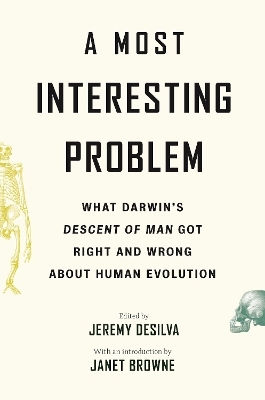
A Most Interesting Problem
What Darwin’s Descent of Man Got Right and Wrong about Human Evolution
Seiten
2022
Princeton University Press (Verlag)
978-0-691-24206-4 (ISBN)
Princeton University Press (Verlag)
978-0-691-24206-4 (ISBN)
Leading scholars take stock of Darwin's ideas about human evolution in the light of modern science
In 1871, Charles Darwin published The Descent of Man, a companion to Origin of Species in which he attempted to explain human evolution, a topic he called "the highest and most interesting problem for the naturalist." A Most Interesting Problem brings together twelve world-class scholars and science communicators to investigate what Darwin got right—and what he got wrong—about the origin, history, and biological variation of humans.
Edited by Jeremy DeSilva and with an introduction by acclaimed Darwin biographer Janet Browne, A Most Interesting Problem draws on the latest discoveries in fields such as genetics, paleontology, bioarchaeology, anthropology, and primatology. This compelling and accessible book tackles the very subjects Darwin explores in Descent, including the evidence for human evolution, our place in the family tree, the origins of civilization, human races, and sex differences.
A Most Interesting Problem is a testament to how scientific ideas are tested and how evidence helps to structure our narratives about human origins, showing how some of Darwin's ideas have withstood more than a century of scrutiny while others have not.
A Most Interesting Problem features contributions by Janet Browne, Jeremy DeSilva, Holly Dunsworth, Agustín Fuentes, Ann Gibbons, Yohannes Haile-Selassie, Brian Hare, John Hawks, Suzana Herculano-Houzel, Kristina Killgrove, Alice Roberts, and Michael J. Ryan.
In 1871, Charles Darwin published The Descent of Man, a companion to Origin of Species in which he attempted to explain human evolution, a topic he called "the highest and most interesting problem for the naturalist." A Most Interesting Problem brings together twelve world-class scholars and science communicators to investigate what Darwin got right—and what he got wrong—about the origin, history, and biological variation of humans.
Edited by Jeremy DeSilva and with an introduction by acclaimed Darwin biographer Janet Browne, A Most Interesting Problem draws on the latest discoveries in fields such as genetics, paleontology, bioarchaeology, anthropology, and primatology. This compelling and accessible book tackles the very subjects Darwin explores in Descent, including the evidence for human evolution, our place in the family tree, the origins of civilization, human races, and sex differences.
A Most Interesting Problem is a testament to how scientific ideas are tested and how evidence helps to structure our narratives about human origins, showing how some of Darwin's ideas have withstood more than a century of scrutiny while others have not.
A Most Interesting Problem features contributions by Janet Browne, Jeremy DeSilva, Holly Dunsworth, Agustín Fuentes, Ann Gibbons, Yohannes Haile-Selassie, Brian Hare, John Hawks, Suzana Herculano-Houzel, Kristina Killgrove, Alice Roberts, and Michael J. Ryan.
Jeremy DeSilva is associate professor of anthropology at Dartmouth College. He lives in Norwich, Vermont. Twitter @desilva_jerry
| Erscheinungsdatum | 14.11.2022 |
|---|---|
| Einführung | Janet Browne |
| Zusatzinfo | 19 b/w illus. |
| Verlagsort | New Jersey |
| Sprache | englisch |
| Maße | 133 x 203 mm |
| Themenwelt | Naturwissenschaften ► Biologie ► Evolution |
| Naturwissenschaften ► Biologie ► Humanbiologie | |
| ISBN-10 | 0-691-24206-2 / 0691242062 |
| ISBN-13 | 978-0-691-24206-4 / 9780691242064 |
| Zustand | Neuware |
| Informationen gemäß Produktsicherheitsverordnung (GPSR) | |
| Haben Sie eine Frage zum Produkt? |
Mehr entdecken
aus dem Bereich
aus dem Bereich
Komplette Neuübersetzung. Mit einem Nachwort von Josef H. Reichholf.
Buch | Hardcover (2018)
Klett-Cotta (Verlag)
CHF 67,20
Wie die Vernichtung der Arten unser Überleben bedroht - Der …
Buch | Softcover (2023)
Penguin (Verlag)
CHF 20,95


